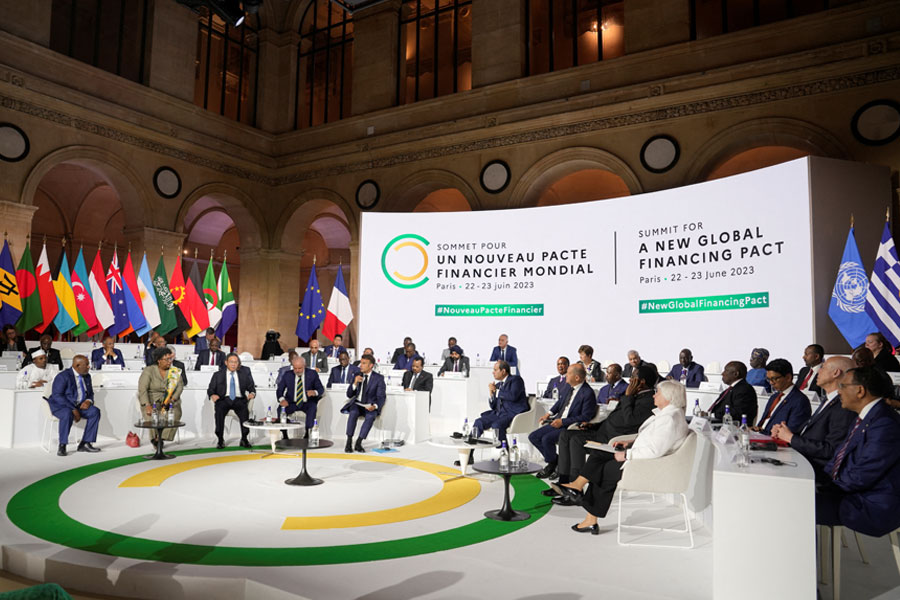
Commentaries | Apr 06,2024
Jul 24 , 2021
By Hoe Ee Khor , Suan Yong Foo
Heightened US-China tensions have raised the prospect of a deep global technology divide, potentially forcing other countries to choose which camp to join. There are plenty of grim scenarios involving irreconcilable splits between core technologies that power a wide range of products and services, from aircraft and automobiles to precision engineering for robotics and payment systems for e-commerce. Should these scenarios materialise, the world’s two largest economies will pour huge amounts of resources into a zero-sum race to control the cutting edge.
Both the United States and China understand the central role of technology in driving their economies and global development. They also know that mastering it, as well as safeguarding relevant intellectual property, can bolster their national security and geopolitical influence, with important feedback effects for their sustained growth and resilience.
In the medium term, the US faces a stiff challenge to its long-standing dominance in science and engineering, as well as to its capacity to produce critical components. For example, although US firms design cutting-edge semiconductors, America’s share of global output has declined from 37pc in 1990 to only 12pc today.
Meanwhile, China, for all its progress, remains a long way from the technological frontier in many products such as computer chips and aeroplanes. True, the country has developed a deep ecosystem in many types of manufacturing, and has an exceptional capacity to produce rapidly and at scale. It is also near the top of the global rankings for patents and research and development expenditure. But China is vulnerable in many areas. It imports about 300 billion dollars worth of semiconductors annually, with approximately half going into export manufacturing. Moreover, many services that are intertwined with goods need semiconductors to operate, as is true of the apps embedded in smartphones.
Other advanced economies with the capacity to design or manufacture critical components in semiconductor supply chains, including Japan, South Korea, Taiwan, and the Netherlands, are caught in the crosshairs of US-China tensions. For these countries, geopolitical considerations will inevitably play a role alongside commercial ones, necessitating careful calculations.
The likeliest medium-term outcome is that technology bifurcation will occur as countries intensify their efforts to reduce their vulnerabilities, but that it will remain contained. US companies are building several high-end semiconductor plants, while China is recruiting global talent and ramping up its R&D in semiconductors and the software, machinery, and equipment needed to produce them.
Meanwhile, other countries are pursuing various options. These include forging alliances to secure supplies of critical components, developing their capability to achieve interoperability between different technology standards, and strengthening their offerings of more sophisticated products and services to global markets, and thus their negotiating positions vis-à-vis the US and China.
But in the longer term, the world needs to be more ambitious, and step up multilateral efforts to boost global technological cooperation. Developed and emerging economies alike should therefore frame issues related to technology tensions in a broader context.
They should start by recalling that economic openness has boosted growth and welfare immensely. In Asia, mainland China’s rapid economic development attests to that. South Korea, Singapore, Taiwan, and Hong Kong, despite having little or no natural resources, also managed to industrialise and modernise, partly through globalisation. And a growing number of developing and emerging economies across Africa, Latin America, and Europe are moving up the income ladder by finding niches and participating in global value chains.
Moreover, no economy – no matter how large or advanced – can turn away from globalisation and ensure that it will always occupy the leading position in all high-tech products, enjoy secure supplies of critical components, and have the capacity to operate an exponentially growing web of intricate production processes. Semiconductors are again a prime example. Their production chain is extraordinarily complex and relies on hundreds of inputs that are processed and produced by highly engineered tools sourced from around the world. Gaining even a foothold in this sector requires huge R&D and a long lead time.
True, a country can reduce its vulnerability to adverse external developments. But the costs could be immense, especially if the objective is to be fully self-sufficient and cost-effective in as many technology products as possible.
Given these constraints, countries should aim for globalisation based on multilateral agreements. One priority should be to disseminate technological advances faster and more widely to both developed and emerging-market economies in order to reduce their vulnerabilities and to enable more newly emerging economies to advance, including via technology transfer. Policymakers should also expand the reach of trade and investment agreements to safeguard the interests of businesses, workers, and countries while minimising the negative externalities of protectionism. This could include expanding free-trade agreements to include dedicated chapters on technology issues and annexes on safeguarding the rights of lower-income and vulnerable workers.
Such developments will not unfold spontaneously. But the corporate sector may be able to help find a constructive way forward without undermining national-security interests. In March, for example, the Chinese and US semiconductor industry associations said they will form a joint working group. Representatives of 10 chip companies from each country will meet twice a year to discuss matters including export restrictions, supply-chain safety, and encryption technology.
The policies adopted by the US and China will of course be key to averting a major technological split. But the rest of the world, by staying above the Sino-American fray, can help to take the lead in forging a new trust-based consensus based on a common vision of shared technological progress.
PUBLISHED ON
Jul 24,2021 [ VOL
22 , NO
1108]

Commentaries | Apr 06,2024

Commentaries | Jan 09,2021

Radar | Dec 05,2020

Featured | Jan 05,2019

Exclusive Interviews | Jun 24,2023

Commentaries | Mar 23,2024

My Opinion | Mar 04,2023

Viewpoints | Sep 18,2021

Featured | Sep 09,2019

Commentaries | Jun 14,2025

My Opinion | 131546 Views | Aug 14,2021

My Opinion | 127902 Views | Aug 21,2021

My Opinion | 125878 Views | Sep 10,2021

My Opinion | 123507 Views | Aug 07,2021

Dec 22 , 2024 . By TIZITA SHEWAFERAW
Charged with transforming colossal state-owned enterprises into modern and competitiv...

Aug 18 , 2024 . By AKSAH ITALO
Although predictable Yonas Zerihun's job in the ride-hailing service is not immune to...

Jul 28 , 2024 . By TIZITA SHEWAFERAW
Unhabitual, perhaps too many, Samuel Gebreyohannes, 38, used to occasionally enjoy a couple of beers at breakfast. However, he recently swit...

Jul 13 , 2024 . By AKSAH ITALO
Investors who rely on tractors, trucks, and field vehicles for commuting, transporting commodities, and f...

Jun 28 , 2025
Meseret Damtie, the assertive auditor general, has never been shy about naming names...

Jun 21 , 2025
A well-worn adage says, “Budget is not destiny, but it is direction.” Examining t...

Jun 14 , 2025
Yet again, the Horn of Africa is bracing for trouble. A region already frayed by wars...

Jun 7 , 2025
Few promises shine brighter in Addis Abeba than the pledge of a roof for every family...

Jun 29 , 2025
Addis Abeba's first rains have coincided with a sweeping rise in private school tuition, prompting the city's education...

Jun 29 , 2025 . By BEZAWIT HULUAGER
Central Bank Governor Mamo Mihretu claimed a bold reconfiguration of monetary policy...

Jun 29 , 2025 . By BEZAWIT HULUAGER
The federal government is betting on a sweeping overhaul of the driver licensing regi...

Jun 29 , 2025 . By NAHOM AYELE
Gadaa Bank has listed 1.2 million shares on the Ethiopian Securities Exchange (ESX),...